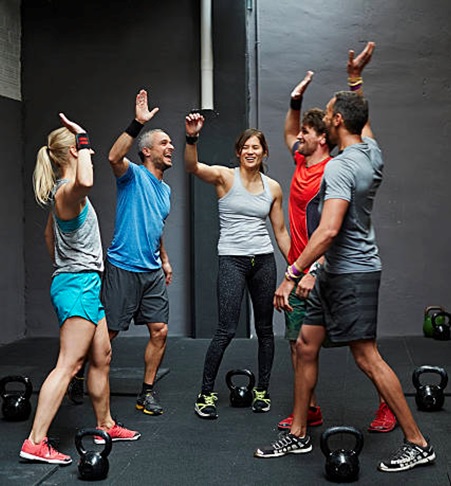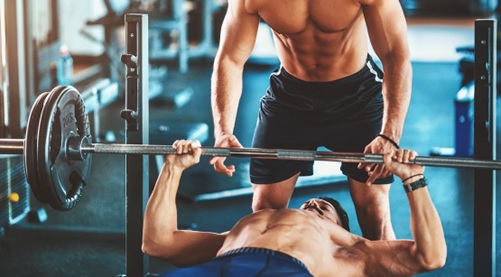
Ever noticed that you push yourself harder during group workouts compared to gym sessions alone? Or maybe you try your best when involved in team sports as opposed to solo pursuits. You might be experiencing the Köhler effect. If you don’t know what that is then read below. This psychological phenomenon is very interesting and might help you figure out a way to push yourself harder in the gym.

Who Was Köhler?
Otto Köhler was a German psychologist. He wanted to figure out why some people work harder in group environments compared to when they’re alone. In the 1920’s, he conducted experiments to see if people would push themselves harder during exercise if they were doing it in front of other people. He asked subjects to do standing bicep curls until failure, first by themselves and then again in a small group of two or three others. What he found was that most research participants were able to do more bicep curls when in a group of people stronger than them, compared to being on their own. Some lifted up to three times as much weight when other people were watching them.
What Is The Köhler Effect?
Köhler’s bicep curl experiment led to what is now known as the “Köhler effect”. This occurs when a weaker member of a group persists through a difficult task in order to keep up with their peers. The subjects in Köhler’s experiment who lifted heavier in the group test were likely doing so because they felt socially pressured and didn’t want to let the team down. Subsequent psychology studies have found that inferior members of a group tend to push themselves much harder in order to keep up.
It is thought that the Köhler effect works for two reasons. The first is the social comparison mechanism. A weaker individual will improve their personal performance if they see others doing better than they are. When training alone, we set a goal based on how we think we can perform. However when you see others lifting heavier, your mind might be inclined to pick up the pace in order to match those around you.
The second explanation why the Köhler effect works is to do with circumstances when a group is working together to achieve a certain outcome. Typically the weaker member of the group might not push themselves very hard. However if the team has a collective goal, all of the group members will work harder than usual in order to achieve it. This is sometimes referred to as “group identification”.
Your motivation to complete a task is much higher when you think you are doing it for the squad. If you feel indispensable to the group, you will go above and beyond for them. This explains why group crossfit workouts can push you out of your comfort zone. Rather than thinking about your levels of fatigue, your mind is focussed on achieving a specific task in order to help the team achieve their collective goal. Our behaviour and thoughts change significantly when we shift from being alone to being a member of a group. The combination of the social comparison mechanism with group identification explains why the Köhler effect can be so pervasive.
How Can You Use It To Work Harder?
The Köhler effect can be useful in a range of environments such as the workplace, sports teams and even the gym. If seIf motivation is keeping you from achieving your gym goals then it might be time to find yourself a gym buddy who is slightly fitter and stronger. What Köhler and subsequent researchers have discovered is that working out with a partner who’s ability level is slightly above yours can improve your ability to persevere through hard exercises. This is also why so many people get personal trainers or do group fitness classes. The pressure to keep up with everyone else distracts you from the pain you feel internally. We behave differently when others are with us.
It should be noted that the Köhler effect doesn’t kick in if you are in a group of people significantly more athletic than yourself. If you are overweight and have never been in a gym, then joining a group of elite bodybuilders may not motivate you because there is too much of a discrepancy between ability levels. In order to reap the most benefit from the Köhler effect, you mtaust be training with people slightly more capable than you but not so elite that you feel demotivated. Like with most things, a happy medium is key.
Interestingly, researchers have found that men who are outperformed by women will experience the Köhler effect to a greater degree. Men who see women outlifting them will work much harder compared to those who see other men lifting heavier. Likely due to the social expectation that men are expected to be physically stronger than women. This shows that the composition of your group matters and guys wanting to improve their gym performance should perhaps find a strong female to motivate them while they train.
Conclusion
Peer pressure is not always a bad thing. Motivation will come and go, but a stronger gym buddy is always there to keep you accountable. Sometimes intrinsic motivation is not enough to help us achieve our goals and that is okay. You can work around this by joining a group fitness class, finding slightly stronger gym partners or doing team workouts where you all work towards a certain outcome. They say the mind gives up before the body ever does. Sometimes it’s beneficial to trick your brain into working harder. Psychology research can be extremely applicable to health and fitness. Give it a try for yourself. Find some strong friends to train with and see if the Köhler effect works on you.
